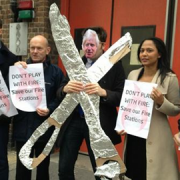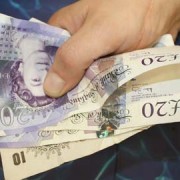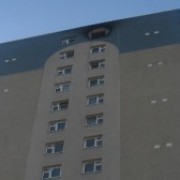
Questions have been asked of the Metropolitan Police's use of resources. Photo: Wikimedia Commons
Sweeping through five boroughs, dozens of police officers recently carried out a major operation to disrupt London’s vice trade, removing cards from phone boxes and making several arrests.
Yet despite widespread reports of a rise in trafficking and prostitution associated with the Olympic construction site, the drive was not considered necessary in any of the five host boroughs, which include Tower Hamlets and Hackney.
Earlier in the year £600,000 was made available to create a new unit tackling vice related crime in these areas in the lead-up to the 2012 Games. However, police have admitted there has been no evidence of any increase, with 25,000 construction workers now on site. A small increase in prostitution has been identified in just one borough – Newham, the closest to the site.
Some are now beginning to question whether the money should have been spent establishing a special police unit targeting what critics say might be a phantom problem.
A spokeswoman from the English Collective of Prostitutes said the unit drains “hefty” funds and “is based on one unsubstantiated claim after another”.
“Sex workers in the vicinity of the Olympic site report being raided and prosecuted despite working in well-run, established premises,” she said. “Throwing women out of premises results in more women being forced to work on the street where it is at least ten times more dangerous.
“Even if it is true that there is an increase in prostitution in the run up to the Olympics, what is wrong with that? It doesn’t mean there is an increase in women coerced into the sex industry.”
The new unit was announced by Scotland Yard in July this year, when the Guardian reported that police had “noticed a small increase in women being trafficked into the [Olympic] areas to work in brothels.” This week several national newspapers said there had been a recent increase in vice activity in the five Olympic host boroughs.
But in a statement to ELL news, Scotland Yard admitted there has been no such increase. Of the new unit, it said: “Since its launch the team has seen a rise in prostitution in Newham borough but so far there is no evidence to support any increase in trafficking.”
The admission is likely to be seized upon by critics who argue that the unit is essentially a “preventative strategy” to the tune of more than half a million pounds, and yet another example of police wasting resources on perceived rather than actual crimes.
Earlier this year politicians and police forces faced accusations of exaggeration after a cross-agency investigation that lasted six months and involved every police force in the country failed to find a single woman trafficked into prostitution.
In a report into potential vice activity at the Vancouver 2010 Winter Olympics published this summer, the Sex Industry Worker Safety Action Group said: “The commonly held notion of a link between mega sports events, TIP (Trafficking in Persons) and sex work is an unsubstantiated assumption.”
Detective Chief Superintendent Richard Martin, who heads the Metropolitan Police’s clubs and vice unit, admitted: “We have not seen a major rise in trafficking activity associated with the Games at present but if we do we will be able to deal with it quickly.
“We are trying to identify criminal networks which may try and exploit the Olympics. We do not want to see a repeat of what happened in Athens in 2004 when there was a 95 per cent increase in trafficked women.”





Really interesting stuff. But I suppose if the cops pre-empt anything successfully we’ll always say it was never going to happen. Like terrorist attacks may be? As far as I can tell we’d have been none the wiser if the police hadn’t released a video of a “sex slave” being sold on Oxford Street. I wonder why they did that if there isn’t a problem?
There was no rise of 95% in trafficked women at the Athens Olympics. There was a rise of 95% in persons (to 181) detected as having been trafficked, including trafficking for forced labour, begging and domestic service, in the whole of Greece in the whole of 2004.
But there again, these are facts, and we can’t expect ther Met to get those right.